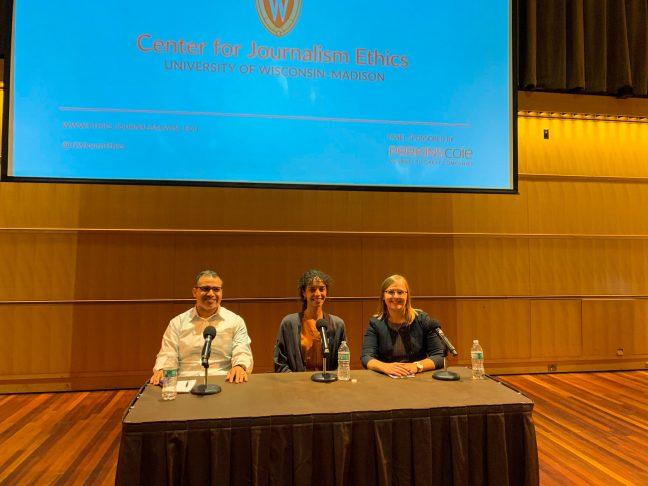The Center for Journalism Ethics hosted a panel of experts for an event entitled On the Border and Beyond: Ethics and Immigration Reporting at the Overture Center for the Arts Wednesday night.
University of Wisconsin journalism professor Kathleen Culver moderated the panel, which consisted of New York Times reporter Caitlin Dickerson, UW professor of labor education Armando Ibarra and 90 Days, 90 Voices executive director Nissa Rhee.
The panel overwhelmingly stressed the importance of using ethical language and thinking about whether coverage represents immigrants fairly. Specifically, Ibarra brought up the term “illegal immigrant.” Ibarra explained how the “i” word, meaning illegal, triggers both sides of the political aisle.
ICE answers Rep. Mark Pocan’s FOIA request after more than four months
Dickerson extended the idea by pointing out that the use of the word “illegal” in reporting can create a misunderstanding for media consumers. Dickerson explained seeking asylum in the U.S. is legal, but the “i” word creates the falsehood that it’s illegal. Dickerson said she does her best to avoid using such language in her reporting.
“I just feel like I’m allergic to all of the catchphrases that politicians use across the political spectrum,” Dickerson said. “I try to just be clear, and be descriptive and just avoid those names as much as possible.”
Culver briefly joined the conversation to add the AP Stylebook actually altered its style guide in 2013 regarding the phrase “illegal immigrant.” In an April 2, 2013 announcement, AP guidelines said the term “illegal” should only be used in direct quotes or to describe an action, not a human being.
Culver also said AP received backlash for the change, as some felt a large number of immigrants were in fact in the U.S. illegally, but AP held firm, and said using the term “illegal immigrant” might not be accurate in all cases.
Ibarra said language misusage and misrepresentation can frame immigrants in a certain way, which affects public attitudes toward immigrants in general.
“And that framing is, is that the immigrant that’s coming from south of the border, is the criminal,” Ibarra said. “What else? The unkempt drunkard that is coming here to steal your benefits and your jobs.”
Rhee said the immigration story, in reality, is not one singular story, and media miss many of the nuances of the immigration system.
Rhee called on the audience to challenge the media’s representation, as well as society’s representation, of what an immigrant is.
“I would really press you to, to learn more about the people that are coming, why are they coming and challenge some of the media’s narrative, or society’s narrative about who immigrants are,” Rhee said.













